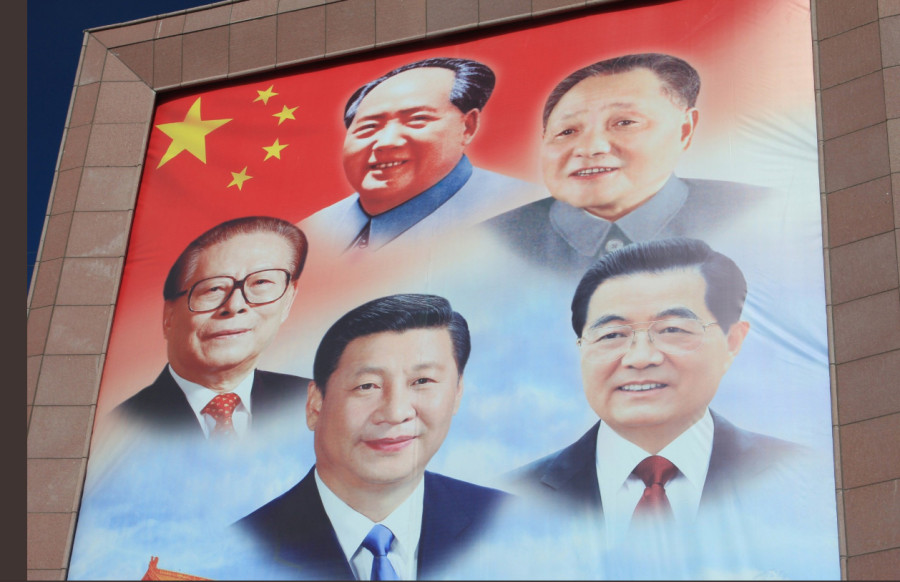Columns
When Deng Xiaoping came to Kathmandu
Forty years before Xi came visiting, Deng announced the birth of a new China in Kathmandu. What will Xi's visit bring?
Amish Raj Mulmi
Before Xi, there was Deng. In February 1978, the architect of modern China embarked on a visit to Myanmar (then Burma) and Nepal, a trip intended to showcase Beijing’s return to normalcy after years of seclusion under the Cultural Revolution and the post-Mao purge. Although not the head of state, Deng was the highest-ranking Chinese official to visit Kathmandu after Vice Premier Chen Xilian in 1975.
For Nepal, Deng’s visit was to provide a ‘counterweight’ to India, especially since Delhi had rejected newly coronated king Birendra’s ‘Zone of Peace’ (ZOP) proposal. Deng’s visit was supposedly at Nepal’s initiative, and ‘in its timing (following soon after Indian prime minister [Morarji] Desai's visit to Nepal last month) once again indicates Nepal's interest in trying to demonstrate a balanced relationship with both India and China.’ Nepal also hoped, according to the CIA’s analysis from the time, that the visit would ‘strengthen’ its hand during negotiations with India on trade and transit agreements.
An archival video reel shows Deng landing in Kathmandu airport on a clear February morning in 1978, and being greeted by pancha-kanyas with garlands and flowers, and by hundreds of youth waving Nepali and Chinese flags (the road condition in Kathmandu is noticeably better too). The CIA noted Deng was showered with ‘protocol-breaking attention’. The American Embassy concurred. ‘GON [Government of Nepal] pulled out all stops [sic] to give Chinese leader warm, effusive welcome. All of expected occurred—heavy press play, large crowd at airport, flag waving children, banners around town, exchange of dinners and open air civic reception.’ Kathmandu was paying special attention to Deng, the Americans wrote. Then prime minister Kirti Nidhi Bista hosted Deng, despite the latter not being a head of state. And king Birendra and queen Aishwarya returned to Kathmandu from the middle of a month-long visit to the far-west. ‘Only days before Yugoslav VP had been flown to Surkhet in west to have his audience with king… Teng [sic] was no ordinary visitor and normal protocol was broken to make that clear.’
Nepal’s expectations, according to a news report from the time, were for increased trade and ‘possible joint tourism projects’ in Tibet. Embassy reports suggest at least one other issue was on the agenda: Nepal had queried about ‘regional waters development’, but the Chinese had said the issue needed more study. Deng reiterated China’s support to Birendra’s ZOP proposal, and said Nepal and China treated each other as ‘equals with sincere openness’, which the Nepali press regarded as a ‘jibe to India’. But despite going all out to woo Deng, Birendra and Kathmandu were to discover this was not the old revolutionary China of Mao’s time. Instead, as Deng declared at the 1978 Communist Party of China plenum, ‘the party would pursue growth in its quest for national security.’
Deng’s visit would mark a clear shift in Chinese foreign policy from previous years. Although Chinese aid amounts increased, there would be no positive developments on the trade and tourism front. Deng was ‘very cautious’ about opening up Tibet, ‘noting access to tibet is "very difficult."’ Nepal’s hopes that China would agree to ‘regional efforts to harness Himalayan water resources’ also came up short, with Deng ‘explicitly [ruling] out any near-term Chinese participation’. Deng’s comments on the ‘crushing’ of the gang of four after Mao’s death and on the ‘continuous, gigantic efforts’ China was making to capitalise on the lost years of the Cultural Revolution wasn’t really intended for Kathmandu, but the Americans heard him intently. Most importantly, he said China was ‘eager’ to develop friendly relations with India; in doing so, he was reaching out to New Delhi, hoping to pull it away from the Soviet embrace.
It was clear China’s priorities were changing under Deng. ‘[T]he days when Nepal could ask China to compete with India in providing aid were over… The spirit of the Deng era was China first.’ The continuity with Mao’s pragmatism could be seen—‘not to let specific problems get in the way of the overall relationship’—with Deng’s views on the Sino-American relationship and on Hong Kong’s status. Although Deng’s Kathmandu visit was high on symbolism and marked the change in Beijing’s outlook towards the world, few of Nepal’s expectations were met. If Kathmandu thought Deng’s visit would act as a counterweight to Delhi’s presence, they were mistaken. Indian officials and its press took a ‘positive attitude’ to Deng’s visit, playing up his comments about improving relations. On the whole, the Americans noted, Nepal was ‘fully satisfied’ with the results—a conclusion that seems overly magnanimous in retrospect. As the embassy concluded, the key takeaway from the visit for both countries was that ‘he came’.
Deng’s visit, like Xi’s visit next week, came at a crucial time for Beijing. China had just begun to embark on its economic reform programme, a momentous event in the history of the modern world. The 1978 visit intended to signal a break from the past; China’s insularity under the Cultural Revolution was to be shrugged off. Deng would reach out to the US, with Washington recognising the People’s Republic of China in 1979, in an effort to increase industrial and economic contact.
The irony, however, is unmissable. Unlike in 1978, Xi’s visit comes at a tumultuous time for China. Despite massive celebrations marking the PRC’s 70th anniversary, during which it displayed its military might for the rest of the world to see, Beijing is troubled on several fronts in its quest for global power status. Hong Kong remains restive nearly four months into the protests; new questions have emerged around Xinjiang; the trade war with the US seems to be linked with these issues. Xi will also travel to Mamallapuram, the historical South Indian temple town, to meet with his Indian counterpart Narendra Modi, whose American visit seemed to deepen the ties between the Republicans and the governing Bharatiya Janata Party through the diaspora. Beijing needs Delhi—if not as an ally, at least as a neutral—in its struggles with Washington.
For Kathmandu and its ruling class, Xi’s visit will be highlighted as a significant achievement even if no agreement of substance is signed. The ruling party has already moved away from the spirit of the American-led Indo-Pacific umbrella with its wholehearted support of Xi Thought, but Beijing cannot afford to think it now has ‘all-weather friends’ in Kathmandu. Nepali politicians have mastered the art of switching allegiances according to where the wind blows, and China would be better off engaging across party lines and positions, rather than putting its eggs in the basket of Nepali communists whose opportunism has exemplified politics in Nepal.
***
What do you think?
Dear reader, we’d like to hear from you. We regularly publish letters to the editor on contemporary issues or direct responses to something the Post has recently published. Please send your letters to [email protected] with "Letter to the Editor" in the subject line. Please include your name, location, and a contact address so one of our editors can reach out to you.




 9.7°C Kathmandu
9.7°C Kathmandu















